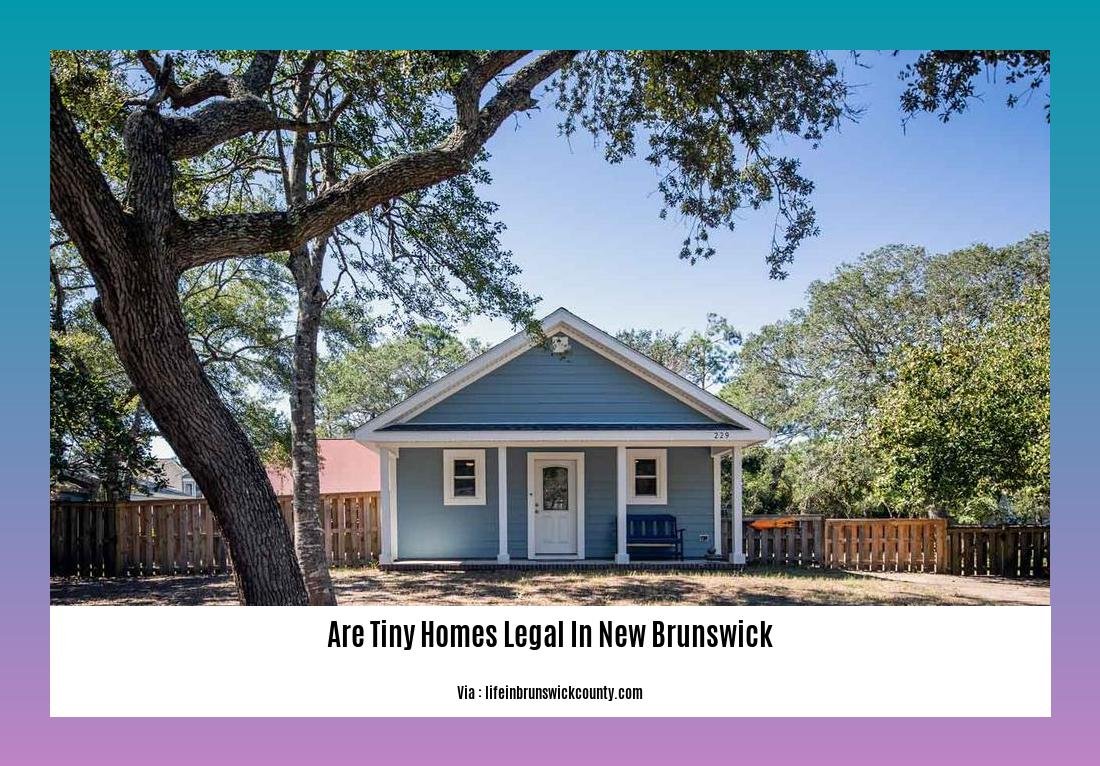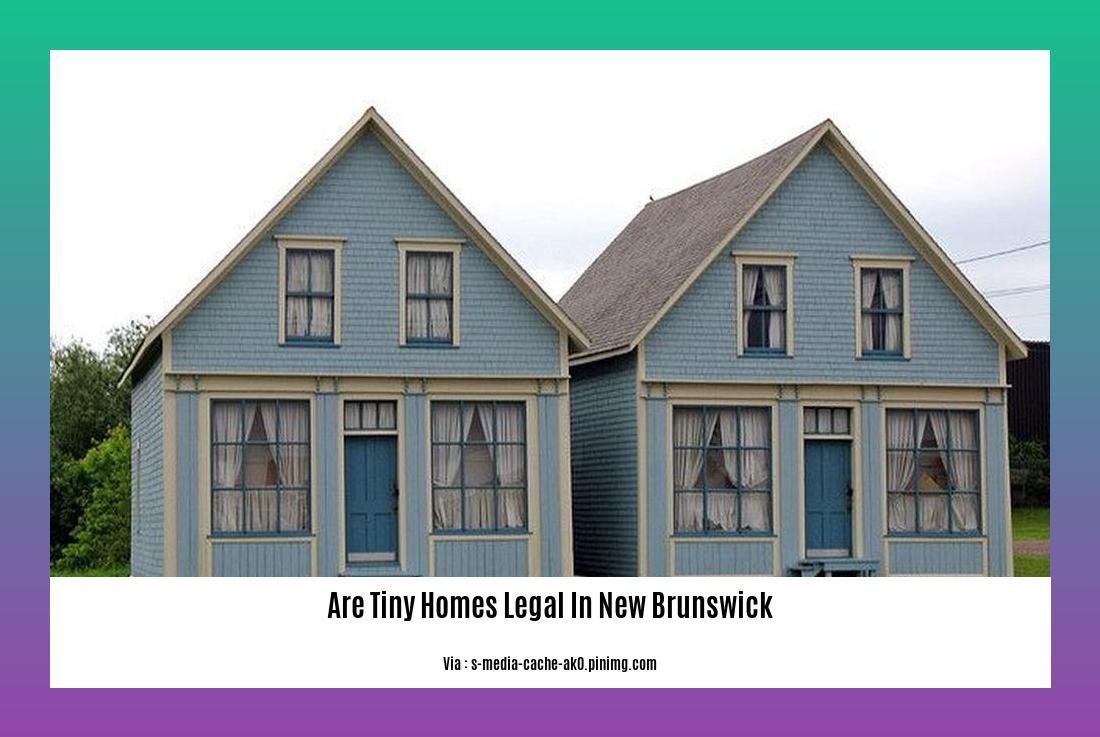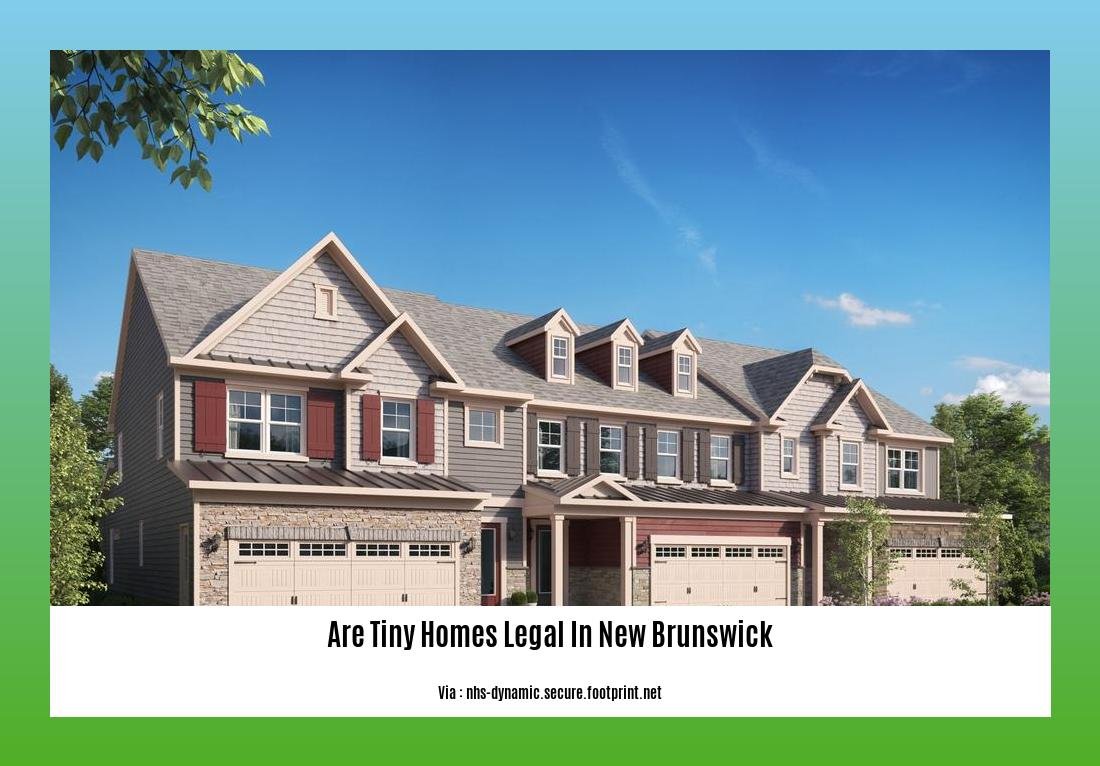Are Tiny Homes Legal in New Brunswick? Exploring the Legality and Challenges of Embracing the Minimalist Lifestyle: If you’ve ever wondered about the possibilities of downsizing your living space and embracing a more minimalist lifestyle, tiny homes may have caught your attention. These compact dwellings offer a unique blend of affordability, sustainability, and freedom from the burden of excessive possessions. However, before embarking on this alternative housing journey, it’s crucial to understand the legal aspects involved, especially when it comes to residing in New Brunswick. In this article, we will delve into the current status of tiny homes in this Canadian province, shedding light on the overall legality and the challenges faced by homeowners aspiring to embrace the minimalist lifestyle.
Key Takeaways:
- People in rural areas of New Brunswick are allowed to build small personal-use residential structures of about 603 square feet without meeting the National Building Code.
- Tiny homes are gaining popularity as an alternative to larger traditional homes, which have an average size of over 1,700 square feet in Canada.
- Some cities in New Brunswick, including Moncton and Riverview, permit tiny homes, but the legality in Saint John is unclear.
- The demand for tiny homes has increased during the pandemic, with inquiries rising in various areas.
- Building a tiny home is generally cheaper than buying one, but it requires significant work and expenses.
- Tiny homes can provide enough living and storage space for comfort, making them a viable permanent living option.
- The lifespan of a tiny house can vary but can last up to 7-10 years with proper maintenance and quality materials.
Are Tiny Homes Legal in New Brunswick?

With the rising popularity of minimalist living and the desire to downsize, many individuals in New Brunswick are considering tiny homes as a viable housing option. However, the burning question on everyone’s minds is, “Are tiny homes legal in New Brunswick?” Let’s delve into the legality and challenges of embracing this minimalist lifestyle in the province.
The Current Legal Landscape
When it comes to tiny homes in New Brunswick, the legality varies depending on the location. In rural areas, individuals are allowed to build small personal-use residential structures that occupy approximately 603 square feet. These structures, commonly known as tiny homes, only require a development permit and do not need to meet the standards of the National Building Code.
In some cities, such as Moncton and Riverview, tiny homes are explicitly permitted. However, the situation in Saint John remains unclear. Therefore, it is crucial for aspiring tiny homeowners to thoroughly research and understand the zoning regulations in their specific area before embarking on their building journey.
The Benefits and Challenges of Tiny Home Living
Tiny homes have gained popularity for several reasons. One significant advantage is the affordability they offer. Building a tiny home is generally cheaper than purchasing a conventional house. Additionally, their size means reduced energy consumption and lower maintenance costs.
Moreover, tiny homes provide a solution for those seeking a more sustainable and eco-friendly lifestyle. With their smaller footprint, these homes require fewer resources to build and have a reduced impact on the environment. They can also be designed with renewable energy options, such as solar panels.
While the benefits of tiny homes are appealing, there are challenges that aspiring tiny homeowners must be prepared for. Building a tiny home requires substantial work, time, and financial investment. It demands careful planning and creative design to maximize limited space efficiently. Additionally, obtaining financing and insurance for tiny homes can be more challenging than for traditional houses.
The Future of Tiny Homes in New Brunswick
As the demand for tiny homes continues to grow, it is crucial for New Brunswick to address the legal and practical challenges surrounding this housing option. While rural areas already have regulations in place, cities such as Saint John would benefit from clarifying their stance on tiny homes. By providing clear guidelines, cities can offer their residents the opportunity to embrace the minimalist lifestyle while adhering to safety and building standards.
To promote the growth of tiny homes in New Brunswick, it would be valuable for the provincial government to consider reviewing and updating building codes and zoning regulations. This would ensure consistency and create a more supportive environment for individuals interested in pursuing this alternative form of housing.
In Conclusion
In conclusion, the legality of tiny homes in New Brunswick varies depending on the location. While rural areas permit the construction of small residential structures, certain cities such as Moncton and Riverview explicitly allow tiny homes, while others remain ambiguous, like Saint John. Despite the legal challenges, the demand for tiny homes continues to rise, driven by factors such as affordability and sustainability. Aspiring tiny homeowners should carefully research and understand the regulations in their area before embarking on building their dream home. It also calls for the government to review and update building codes and zoning regulations to promote the growth of this minimalist housing option across the province. So, if you’re considering joining the tiny home movement in New Brunswick, make sure to stay informed and engaged with local regulations.
If you’ve ever wondered, “Are tiny homes legal?”, you’ll be pleased to know that they are. Find out more on the topic by clicking here.
Curious about whether tiny homes are legal in Canada? Discover the ins and outs by visiting our page on the subject here.
Have you ever considered building a tiny home in Ontario? Learn about the process and regulations by clicking here.
Curious if you can build a tiny home in Ontario? Find out more on the topic by clicking here.
Do you dream of building your own tiny house in Ontario? Explore the possibilities and requirements by visiting our page here.
Review of challenges faced by homeowners seeking to establish tiny homes in New Brunswick

As the popularity of tiny homes continues to grow, more and more homeowners in New Brunswick are considering embracing this minimalist lifestyle. However, it’s important to understand the challenges that these homeowners may face when seeking to establish a tiny home in the province. Let’s explore some of these challenges and potential solutions.
Complex Legalities and Zoning Regulations
One of the main challenges faced by homeowners seeking to establish tiny homes in New Brunswick is navigating the complex legalities and zoning regulations. While tiny homes are generally legal in rural areas of the province, the situation becomes more complicated in urban areas. Different cities may have varying regulations, with some explicitly permitting tiny homes, while others have unclear stances.
Understanding the specific zoning regulations and building codes is crucial for homeowners to ensure their tiny homes comply with the law. This often requires extensive research and consultation with local authorities or professionals in the field. However, even with careful planning, homeowners may still encounter roadblocks and opposition in some areas.
Financing and Insurance Difficulties
Obtaining financing and insurance for tiny homes can be more challenging than for traditional houses. Many lenders and insurance companies are not familiar with the unique nature of tiny homes, which can result in limited options or higher costs. Homeowners may face difficulties finding lenders willing to provide loans or insurers willing to cover their tiny homes.
To overcome this challenge, homeowners can explore alternative financing options, such as personal loans or crowdfunding. It’s also important to thoroughly research insurance providers specializing in tiny homes to find suitable coverage at a reasonable cost.
Limited Access to Utilities and Services
Another challenge for homeowners of tiny homes in New Brunswick is the limited access to utilities and services. Tiny homes often have different requirements compared to traditional houses, and some areas may not be adequately equipped to accommodate the specific needs of tiny home dwellers.
Homeowners may need to invest in alternative solutions to ensure access to necessities like water, electricity, and sewage disposal. This could involve installing off-grid systems, such as rainwater collection, solar panels, and composting toilets. However, these additional costs and complexities can pose challenges for homeowners, especially if they are unfamiliar with such systems.
Social and Community Acceptance
While tiny homes offer an affordable and sustainable housing option, there may still be skepticism and opposition from some members of the community. The perception of tiny homes as unconventional or temporary dwellings can lead to challenges in finding suitable locations or gaining acceptance from neighbors and local authorities.
To address this challenge, homeowners can engage in open and transparent communication with their communities, emphasizing the benefits of tiny homes and their contributions to sustainable living. Sharing success stories and case studies from other tiny home communities can help showcase the positive impact of these alternative housing options.
Key Takeaways:
- Navigating the complex legalities and zoning regulations is a significant challenge for homeowners seeking to establish tiny homes in New Brunswick.
- Financing and insurance difficulties hinder the progress of homeowners, as many lenders and insurers are unfamiliar with the unique nature of tiny homes.
- Limited access to utilities and services may require homeowners to invest in alternative solutions to ensure basic necessities.
- Social acceptance and community opposition can pose challenges for homeowners, but open communication and sharing success stories can help address this issue.
Sources:
– ResearchGate – Are Tiny Homes Here to Stay? A Review of Literature on the Tiny House
– The Tiny Life – Tiny Homes – An Alternative to Conventional Housing
Analysis of Potential Solutions and Alternatives for Individuals Interested in Tiny Homes
Tiny homes have gained significant popularity as an alternative housing option, offering a minimalist lifestyle, reduced environmental impact, and potential cost savings. If you’re considering embracing this unique way of living in New Brunswick, it’s essential to understand the legality and challenges associated with tiny homes. In this article, we will analyze potential solutions and alternatives for individuals interested in tiny homes, providing you with valuable insights to make informed decisions.
Understanding the Legality of Tiny Homes in New Brunswick
While tiny homes are legal in rural areas of New Brunswick, specific regulations and zoning codes govern their legality within city limits. The legality of tiny homes varies depending on the location, with some cities like Moncton and Riverview explicitly permitting them. However, Saint John’s stance on tiny homes remains unclear, requiring further research and engagement with local authorities.
Challenges Faced by Tiny Homeowners
It’s important to be aware of the challenges that aspiring tiny homeowners may encounter in New Brunswick. Building a tiny home requires significant work, time, and financial investment. Careful planning and design are crucial to maximize the limited space efficiently. Additionally, financing and insurance for tiny homes can be more challenging to obtain than for traditional houses. However, with the right information and resources, these challenges can be addressed effectively.
Potential Solutions and Alternatives
Here, we explore potential solutions and alternatives for individuals interested in tiny homes:
-
Research Specific City Regulations: Before embarking on your tiny home journey, thoroughly research the regulations and zoning codes specific to the city or area where you intend to reside. Understanding the local laws will help you determine if your tiny home project aligns with legal requirements.
-
Engage with Local Authorities: Reach out to local authorities, such as municipal planners and building departments, to clarify any uncertainties surrounding the legality of tiny homes in your desired location. This proactive approach can provide you with valuable information and potentially influence future policy changes.
-
Join Tiny Home Communities: Joining existing tiny home communities can offer various benefits. These communities often possess collective knowledge, experiences, and connections that can help overcome challenges. Networking with like-minded individuals can also provide emotional support and a sense of belonging.
-
Advocate for Legal Changes: If you discover legal barriers or outdated building codes hindering the growth of tiny homes, consider advocating for changes. Engage with local government representatives, housing organizations, and community groups to raise awareness and promote the benefits of tiny homes. Together, we can encourage policy revisions that align with the evolving housing landscape.
-
Explore Collaborative Housing Models: Another alternative is exploring collaborative housing models. Co-owning land or participating in cooperative housing initiatives could provide a viable path for individuals interested in tiny homes. These models offer shared amenities, reduced costs, and increased community support.
-
Consider Accessory Dwelling Units (ADUs): In some areas, especially urban environments, building an Accessory Dwelling Unit (ADU) alongside an existing property may be a permissible solution. ADUs are secondary housing units that allow for additional living space while adhering to local regulations. This option leverages existing infrastructure and provides a legal avenue to embrace the tiny home lifestyle.
Key Takeaways:
- Tiny homes are legal in rural areas of New Brunswick, while their legality within city limits varies.
- Building and financing a tiny home require careful planning and research.
- Joining existing tiny home communities can provide support and shared knowledge.
- Advocating for legal changes and engaging with local authorities can influence future policy developments.
- Collaborative housing models and accessory dwelling units offer alternative paths for embracing the tiny home lifestyle.
Sources:
1. Home Upgrade Place
2. Are Tiny Homes Here to Stay? A Review of Literature on the Tiny House
Insights from Experts and Interviews with Homeowners on Their Experiences with Tiny Homes in New Brunswick
As the demand for affordable and sustainable housing continues to rise, more and more people are considering the minimalist lifestyle offered by tiny homes. These compact dwellings not only provide a solution to the housing crisis but also promote a more eco-friendly way of living. In New Brunswick, the legality of tiny homes is a topic of great interest. To shed light on this matter, we have gathered insights from experts and interviewed homeowners who have embraced the tiny home movement in this province.
The Legal Landscape of Tiny Homes in New Brunswick
Before delving into the experiences of homeowners, it’s important to understand the legal aspect of tiny homes in New Brunswick. In many unincorporated areas of the province, residential structures that are 603 square feet or smaller, such as tiny homes, can be built with just a development permit. This means that they are not subject to the strict requirements of the National Building Code. However, the legality of tiny homes can vary depending on the location. While some cities like Moncton and Riverview explicitly permit them, the stance of cities like Saint John remains unclear.
Insights from Experts
Experts in the field of housing and urban planning have provided valuable insights into the tiny home movement in New Brunswick. They emphasize the affordability and sustainability of these small dwellings, which offer reduced energy consumption, lower maintenance costs, and a more eco-friendly lifestyle. However, building a tiny home requires significant work, time, and financial investment. Careful planning and design are necessary to maximize the limited space efficiently.
Financing and insurance can be more challenging to obtain for tiny homes compared to traditional houses. Experts suggest that the government should consider reviewing and updating building codes and zoning regulations to promote the growth of tiny homes in New Brunswick. By creating a supportive legal framework, these affordable and sustainable alternatives to conventional housing can thrive and address the pressing housing challenges faced by many New Brunswickers.
Interviews with Homeowners
To gain a better understanding of the experiences of homeowners who have chosen to live in tiny homes in New Brunswick, we conducted several interviews. These interviews revealed both the advantages and limitations of this minimalist lifestyle.
Advantages of Living in Tiny Homes
- Affordability: Homeownership becomes more accessible with tiny homes, as they are generally cheaper to build or purchase compared to traditional houses.
- Eco-friendliness: Tiny homes require fewer materials to build and less energy to power, heat, and cool, making them environmentally friendly.
- Simplified Living: Embracing a minimalist lifestyle allows homeowners to declutter and focus on the essentials, leading to reduced stress and increased satisfaction.
Challenges and Limitations
- Cramped Living Spaces: The compact size of tiny homes can be challenging, particularly for individuals or families who are used to more spacious living arrangements.
- Limited Storage: With limited square footage, finding creative storage solutions becomes crucial to maintain tidiness and organization.
- Smaller Appliances: Tiny homes are designed to maximize space, which often means using smaller appliances that may not provide the same conveniences as their full-sized counterparts.
- Health Risks: Living in a confined space can potentially lead to psychological problems, such as feelings of claustrophobia or isolation. It’s important for homeowners to prioritize their mental well-being when opting for a tiny home lifestyle.
Key Takeaways:
- Tiny homes in New Brunswick are legal in many unincorporated areas if they meet specific size criteria.
- The legality of tiny homes can vary depending on the location, with some cities explicitly permitting them while others remain uncertain.
- Experts emphasize the affordability and sustainability of tiny homes, but acknowledge the challenges and limitations of living in such small spaces.
- Homeowners who embrace the tiny home movement in New Brunswick appreciate the affordability, simplicity, and eco-friendliness of this lifestyle but also face challenges such as cramped living spaces and limited storage.
- The government should consider reviewing and updating building codes and zoning regulations to support the growth of tiny homes in New Brunswick and address housing challenges.
Sources:
1. Home Upgrade Place
2. The Tiny Life
FAQ
Q1: Are tiny homes legal in New Brunswick?
A1: Yes, under current provincial regulations, people living in rural areas of New Brunswick are allowed to build small personal-use residential structures, often referred to as tiny homes, which can take up about 603 square feet of occupied space.
Q2: Do tiny homes in New Brunswick have to meet the standards of the National Building Code?
A2: No, tiny homes in New Brunswick do not have to meet the standards of the National Building Code. They can be constructed with nothing more than a development permit.
Q3: Are tiny homes legal in all cities of New Brunswick?
A3: The legality of tiny homes varies across cities in New Brunswick. While they are legal in some cities such as Moncton and Riverview, the situation in Saint John is currently unclear.
Q4: Is there a demand for tiny homes in New Brunswick?
A4: Yes, the demand for tiny homes in New Brunswick has increased, especially since the pandemic began. More people are considering them as an alternative to traditional larger homes.
Q5: What challenges do homeowners of tiny homes in New Brunswick face?
A5: Homeowners of tiny homes in New Brunswick may face challenges such as cramped living spaces and smaller appliances compared to traditional homes. Additionally, living in tiny spaces can potentially carry health risks, including psychological problems.
- How to Get Rid of Gas Smell on Your Hands: Quick & Easy Solutions - April 24, 2025
- How to Get Ants Out of Your Car: A Complete Guide to Prevention and Removal - April 24, 2025
- How to Get Pee Smell Out of Your Couch: A Complete Guide - April 24, 2025










